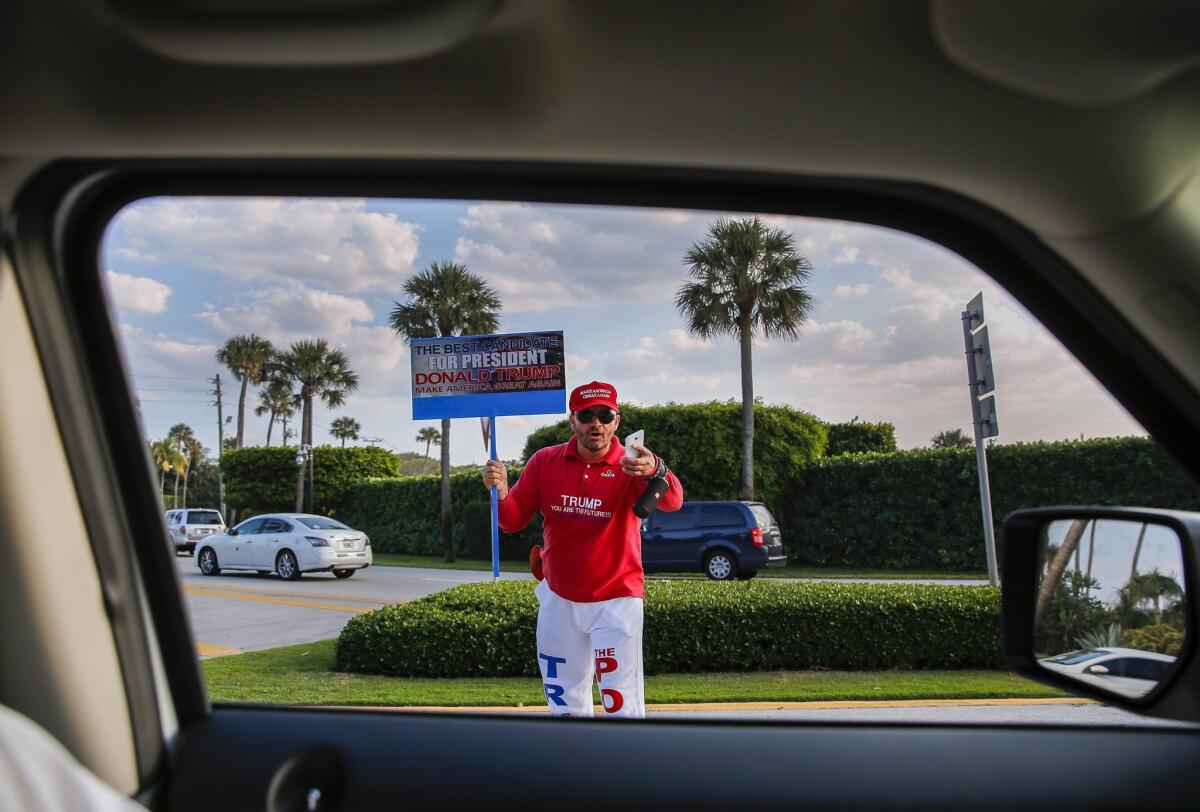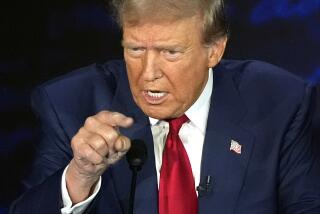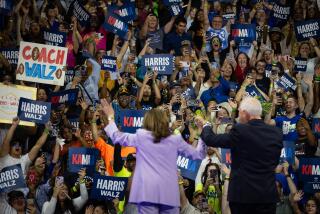Column: Democrats beware: Donald Trump is finding success well outside the Republican fringe

A supporter of Republican presidential candidate Donald Trump stands outside the Mar-a-Lago Club in Palm Beach, Fla. on March 15.
Visits to campaign rallies in Florida this week confirmed what polls have been suggesting for months: Donald Trump is leading the race for the Republican nomination in large part because he’s winning over throngs of nonhabitual voters.
The latest challenger to fall: Sen. Marco Rubio, who lost his home state in a landslide Tuesday and dropped out of the race.
Rubio drew healthy crowds in Florida — a thousand or more in West Palm Beach, 500 or so at a retirement community near Orlando — and his supporters were fervent. But they looked and talked like traditional Republicans: polite, well-dressed, and serious about their conservatism.
Trump is using his impact on primary turnout as a selling point, arguing that if he’s the nominee, he’ll be able to draw more voters to the polls in November.
“Politics is not the same as it used to be,” Nancy Dudley, 73, of St. Augustine, told me with a sigh as she waited for Rubio to speak on Sunday. “The things they’re saying these days! It’s been just terrible.” She sounded more resigned than defiant.
At a Trump rally in Boca Raton, meanwhile, the crowd of 6,000 was younger and much noisier. “We want Trump!” they chanted in unison, a spectacle that would have been striking even if it hadn’t been at night, in an outdoor amphitheater, with spotlights ranging across their heads.
“Trump is the change we need,” Allison Polikoff, 47, of Plantation, told me.
Simply put, there’s a social divide between Trump fans and not-Trump fans, as my colleague Ron Brownstein has noted.
Rubio supporters (and voters for other not-Trump candidates) are disproportionately college-educated, longtime GOP voters. Trump voters are disproportionately blue-collar (which, in practice, sometimes means no collar, plus tattoos), and some said they’d never voted in a GOP primary before.
Some weren’t Republicans at all. “I’m an independent,” said Richard Patronik, 67, of Coral Springs. “I can’t vote in the primary. But I’d vote for Trump if I could.”
Even before election day, Florida officials were reporting that the turnout for early and absentee voting was up sharply over earlier years. And already, Trump is using his impact on primary turnout as a selling point, arguing that if he’s the nominee, he’ll be able to draw more voters to the polls in November.
“We’ve been all over, and the biggest story in all politics worldwide today is what’s happening with the Republican Party,” Trump told a rally in Tampa on Monday. “It’s a phenomenon…. Millions and millions of people are going out and they’re voting. But they’re not voting for Democrats; they’re down 35 % from four years ago. They’re voting for Republicans.”
Ask Trump supporters why they back him, and you hear different versions of the same litany: He’s not a politician. He’s a businessman who can get things done. He doesn’t bow to “political correctness.”
“He’s a billionaire,” explained Deborah Patronik, Richard’s wife.
“He’s saying a lot of things that we’re thinking,” said Gil Brown, 54, an African American businessman from Lakeland. “It’s so refreshing to hear somebody say things clearly.”
(Brown said he wasn’t worried about Trump’s views on race. “I’ve been on the receiving end of racism. I know what it’s like,” he said. “I’m not hearing it from him.”)
Their faith in Trump’s ability as a businessman to overturn the traditional order in Washington is hard to shake with conventional political arguments.
Anti-Trump groups spent more than $15million on television ads in Florida, accusing him of straying from conservative orthodoxy and saying demeaning things about women. Both charges were true, but they didn’t seem to make much difference.
Nor did the violence between Trump supporters and protesters at recent events. One poll even suggested that the incidents made Republicans more likely to vote for Trump, not less, (“They have the 1st Amendment right to say they don’t like what Mr. Trump is saying, but we have the right to hear him, too,” said Brown.)
But what about all those Rubio voters? Will traditional Republicans who loathe what Trump is doing to their party hold their noses and vote for a nominee who breaks all the rules?
The unscientific sample I interviewed this week all said yes: They’ll vote for Trump if it’s the only way to keep Hillary Clinton out of the White House.
“I’m a Republican,” said Dudley, the Rubio voter from St. Augustine. “After a few months, I’ll settle in and vote Republican.”
Even Rubio has said he’ll probably vote for Trump. “I still at this moment continue to intend to support the Republican nominee,” he said Saturday — adding: “But it’s getting harder every day.”
Those are anecdotes, not data. But they suggest that if Trump wins the nomination, he could find a path to winning the votes of most regular Republicans — in addition to all the irregular ones he’s lured to the polls.
Twitter: @doylemcmanus
Follow the Opinion section on Twitter @latimesopinion and Facebook
ALSO
Trump is completely wrong about the U.S. trade deficit
If a clown is elected president, don’t blame the news media
Jon Stewart, where are you? How laughter can help us cope with the 2016 election and other traumas
More to Read
A cure for the common opinion
Get thought-provoking perspectives with our weekly newsletter.
You may occasionally receive promotional content from the Los Angeles Times.











